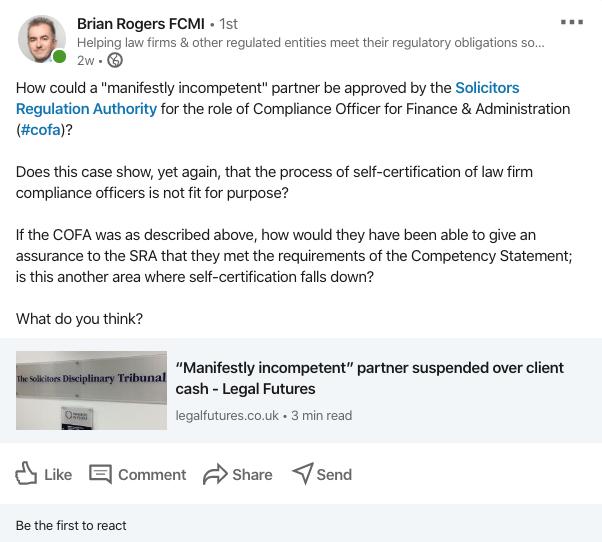How is SRA practising renewal going for you?

This phenomenon is what is known in the trade as “mySRA Face”
UPDATE: Practising renewals have been extended to 20 November 2020
Yes, it’s that time of year again. Practising renewals. Never the most fun job of the year. Unless you enjoy form filling like some kind of masochist.
This year, as an extra special treat, the SRA has updated the mySRA portal.
And what a delight it is…
Our regulator, it seems, has achieved the almost impossible: use improved technology to make a poor system ten times worse.
The first version of mySRA was pretty clunky and unintuitive – but at least it worked, well most of the time. Except that time when nobody had a practising certificate for a couple of months.
mySRA 2.0 was supposed to make your life easier. It is certainly more consistent with the design and layout of the rest of the SRA website.
But that’s where the positives end.
Considering this is the place that the SRA is pushing us to do all of our interactions with them, it has been an utter failure so far.
Let’s start off with some basics: it’s not entirely obvious how to log into the system to begin with. There is no “Log in” button that you would expect, had you ever logged into any website since about 1997.
Once you’re in (if you can get it, but that’s another story), it doesn’t tell you what you need to do to complete your bulk renewal. Considering that every firm has to do the same thing, you might be forgiven for expecting a “Bulk renewal” button on the home page.
But no such luck. You have to go searching for the correct form within a list of obscurely named application forms, within a subsection of a tab. Following me?
Once you have identified the correct form (whoever came up with the name “Pay your periodic fees and apply for bulk renewal” deserves a pay rise), congratulations – you’re at the races!
Next, you just have to overcome some of the many technical glitches that have come to light:
- You have to use the Google Chrome browser with a clear internet history – this is the extent of the help you will get from the Contact Centre, so I’ve just saved you a phone call
- The application form isn’t available to some firms
- Some firms do not have a “My Organisation” section at all
- Others have lost admin rights so cannot sign off the application
- A common problem seems to be that there is no obvious way to proceed to the final Declaration screen. Our good friend Stuart Blake has found out how to fix this
Not that it’s entirely obvious, since it’s not linked from anywhere sensible, but there is some limited SRA Guidance elsewhere on their website.
Although this might seem like a trivial rant, there is a serious point. How many hours are wasted across the profession every year working around poor regulatory systems? Time that could be better spent serving clients better, managing a business through a pandemic, or even…compliance.
Let’s try and put a figure on it.
About 20% of our clients have told us they are struggling with the new mySRA portal. If we ignore those that struggle in silence, and extrapolate across the profession of roughly 11,000 firms – let’s call it 2,000 firms are having difficulties.
How many extra hours will it take to sort out the issue, taking into account DIY attempts, calls, emails, trying other browsers, starting from scratch etc.? Conservatively, let’s say 2 hours on average. Could be less, could be much more.
That’s at least 4,000 hours wasted. At what cost – lost fees, salary, opportunity cost? If we assumed an average salary of £35,000 (an hourly cost to the firm of around £18), that’s £72,000. Not so eye-watering. But what happens when we factor in lost fee earning time – say an average of £100 per hour? That’s £400,000.
Let’s not forget, those are very conservative estimates.
Our profession deserves better.
Tell us how practising renewal is going for you
Guidance

Law Society and SRA Transparency Webinar
Our team recently attended the Law Society webinar “Playing by the price transparency rules – how do I make my website compliant and stand-out from the competition?”.
You can read our overview of the main take-aways here. We also have a copy of the slides if anybody wants them.
ICO issues Subject Access Request detailed guidance
The ICO has issued detailed guidance on the Right of Access, which is a fundamental tenet of the Data Protection Act 2018.
This is an essential resource for COLPs – most firms will receive a subject access request at some point.
Updated Law Society practice notes
- Alternative business structures (ABSs)
- Freelance solicitors
- Solicitors offering legal services to the public from unregulated entities
Spotted on LinkedIn
Brian Rogers makes a valid point here. The authorisation process for new Compliance Officers, and COFAs in particular, is reliant on self evaluation of essential skills and experience. Authorisation Officers at the SRA are probably not best placed to assess a COFA’s competence.
What would the alternative be? Nobody wants to see a return to the days of year-long applications for new firms.
Perhaps a multiple choice “theory test”, like the driving licence, covering key areas of the Accounts Rules.
Question of the week

“What is our duty when English is not our client’s first language? Are we expected to provide translators at our cost?”
Unlike the Equality Act 2010, where the firm has a duty to make reasonable adjustments for disabled clients at no charge to them, the same does not apply in relation to translation.
For example, managing a client with an impairment and using audio, braille, hearing loop or a sign language interpreter would be considered to be at the firm’s expense. Whereas, the non-English speaking client can generally be asked to cover the cost of a translator (and if need be certified translations of correspondence/documents) rather than this being an expense the firm has to meet.
However, you will need to bear in mind the SRA principles, which say that firms must:
- act in a way that encourages equality, diversity and inclusion
- act in the best interests of each client
If the matter is relatively straight forward then a reputable and independent translator could be asked to work with the lawyer and client to translate verbally between them and also to read out documents and correspondence – the translator would need to sign a confidentiality agreement.
If the matter is complex and/or a certified translation of any document is required, a translation firm that specialises in legal sector work should be used.
In the long run, you will need to ensure that the client has full understanding regarding the legal services being provided and also that if a friend or relative offers to translate that there is no duress/coercion and/or misrepresentation of the client’s wishes/instructions.
If you can’t be sure the client understands, and nobody is willing to pay for translation services, the firm probably can’t act for the client.
This all needs to be documented on the file!
For risk management purposes, the matter should be categorised as unusual/high risk, rather than it being low/normal risk.
The ICO’s guidance on data privacy notices is also relevant:
“Sometimes you may want to collect personal data from people whose first language is not English. In some cases you may be obliged by law (other than data protection) to provide information in another language, for example, Welsh. Even where this is not the case, it is good practice to provide your privacy information in the language that your intended audience is most likely to understand.”
Disciplinary decisions

- Kirna Devi Madhas – personal injury solicitor struck off for a catalogue of dishonesty, with financial self-interest at the heart: forging CFAs, failing to advise clients of adverse costs orders, failing to give clients advice on merits, or even telling them the outcome of their case.
- The SDT occasionally sides with the prosecuted solicitor, which can have costs consequences for the SRA. In this case, the SRA was unable to proceed with a prosecution, and having to interview a key witness three years into the investigation







